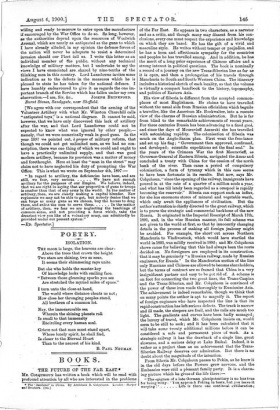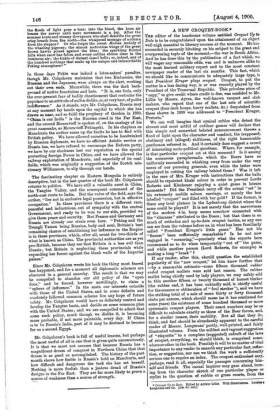BOOKS.
THE FUTURE OF THE FAR EAST.* COLQHHOUN has written a book which will be read with profound attentidn by all who are interested in the problems • The • Overland to Mina. By Archibald R. Colquhoun. Loudon: Harper sad Brother. Ns.] of the Far East. He appears in two characters, as a narrator and as a critic, and though many may dissent from his con- clusions, every one must respect the experience and knowledge on which they are based. He has the gift of a vivid, and masculine style. He writes without temper or prejudice, and he has a keen and affectionate sympathy for the countries and peoples he has travelled among. And in addition, he has the merit of a long prior experience of Chinese affairs and a strong interest in political questions. The book is nominally a record of a journey on the new Trans-Siberian line as far as it is open, and then a prolongation of his travels through Manchuria to South and South-Western China. The itinerary includes a historical sketch of each locality, so that the volume is virtually a compact handbook to the history, topography, and politics of Eastern Asia.
His view of Siberia is different from the accepted common- places of most Englishmen. He claims to have travelled without the usual aids from Russian officialdom which beguile a traveller, like the American Mr. Bookwalter, into a roseate view of the charms of Russian administration. But he is far from blind to the remarkable achievements of recent years., For three centuries Russia has been advancing to a fixed goal, and since the days of Mouravieff Amurski she has travelled with astonishing rapidity. The colonisation of Siberia was much on the Anglo-Saxon plan. First went the free-lance and set up his flag; "Government then approved, confirmed, and developed; scientific expeditions set the final seal." In the years of the Crimean War the first Mouravieff, as Governor-General of Eastern Siberia, navigated the Amur and concluded a treaty with China for the cession of the north bank of the river. Then came a period of compulsory colonisation, a form of tyranny which in this case seems to have been fortunate in its results. But now, says Mr. Colquhoun, "since the opening of the railway, immigrants have poured in at the rate of a quarter of a million souls a year, and what has till lately been regarded as a cesspool is rapidly becoming the reservoir." Siberia can support such an influx, for she has enormous stores of mineral and vegetable weath, which only await the appliances of civilisation. But the author's attention is chiefly directed to the great railway, which is to prove the strategic and commercial backbone of the new Russia. It originated in the Imperial Reseript of March 17th, 1891, and, in the wise Russian manner, its full scheme was not given to the world at first, so that by innocently changing details in the process of making all foreign jealousy might be avoided. For example, the short' cut across Northern Manchuria to Vladivostock, which would have startled the world in 1891, was mildly received in 1895; and Mr. Colquhoun shows cause for believing that this had always been the route decided on. No foreigners are employed in its construction, that it may be genuinely "a Russian railway, made by Russian engineers, for Russia." In the Manchurian section of the line only Russians and Chinese are allowed to become shareholders, but the terms a contract are so framed that China is a very insignificant partner and easy to be got rid of. A scheme is on foot for connecting the two great lines, the Trans-Caspian and the Trans-Siberian, and Mr. Colquhoun is convinced of the power of these iron roads thoroughly to Russianise Asia. The achievement is indeed remarkable, though we think that on many points the author is apt to magnify it. The report of foreign engineers who have inspected the line is that its rapid construction has left serious defects. The track is narrow and ill made, the sleepers are frail, and the rails are much too light. The gradients and curves have been badly managed ; the luxury of travel, which Mr. Colquhoun insists on, would seem to be still to seek ; and it has been calculated that it will take some twenty additional millions before it can be considered a safe and permanent piece of work. As a strategic railway it has the drawback of a single line, great slowness, and a serious delay at Lake Baikal. Indeed, it is rather as a project than as an achievement that the Trans- Siberian Railway deserves our admiration. But there is no
doubt about the magnitude of the intention. -
From Siberia Mr. Colquhoun passes to Pekin, as he knew it in. the old days before the Powers grew nervous, and the Embassies were still a pleasant family party. It is a charm- ing picture which he gives of the life there
The epigram of a late German plenipotentiary is no less true for being witty : ' You approach Peking in tears, but you leave it
weeping !' Life is there one continual exhilaration; the floods of light pour a tonic into the blood, the keen air braces the nerves until mere movement is a joy. After the summer heats and steamy downpours who shall describe the great crisp breath from the north—the whispered message of autumn from the steppes ? Or who forget the sweet lEolian melody of the wheeling pigeons ; the almost motionless wings of the great brown hawks poised against the blue; the sparkling frosted hills when snow has fallen and every outline shines clear in the luminous air; the tinkle of distant camel bells ; or, indeed, any of the hundred nothings that make up the unique and indescribable Peking atmosphere P"
In those days Pekin was indeed a lotus-eaters' paradise, though Mr. Colquhoun maintains that two Embassies, the Russian and the Japanese, were always on the alert, working out their own ends. Meanwhile, there was the dark back- ground of native fanaticism and hate. "It is, one feels, only the ever-present fear of bodily chastisement that restrains the populace to an attitude of sullen dislike, or, at very best, of polite indifference." As it stands, says Mr. Colquhoun, Russia may at any moment lay hands upon the capital to which she has drawn so near, and so fulfil the prophecy of Gordon in 1880. "China is our India" is the Russian creed in the Fax East, and the second Mouravieff is spoken of, on the analogy of his great namesake, as Mouravieff Pekingski. In his chapters on
Manchuria the author sums up the faults he has to find with British policy. We have allowed ourselves to be hoodwinked by Russian diplomats, we have no efficient Asiatic service as Russia has, we have refused to encourage the Reform party, we have by our slackness lost our reputation as the special protecting foreign Power in China, and we have allowed the railway exploitation of Manchuria, and especially of its coal- fields, which was originally a suggestion of the Scotch mis- sionary Williamson, to slip through our hands.
The fascinating chapter on Eastern Mongolia is entirely descriptive, but in the last quarter of the book Mr. Colquhonn returns to politics. We have still a valuable asset in China, the Yangtse Valley, and the consequent command of the north-east route to India. But the value of the field, says the author, "lies not in exclusive legal possession, but in effective occupation." In these provinces there is a different race, peaceful and industrious, out of sympathy with the central Government, and ready to be won to our side, provided we give them peace and security. But France and Germany and Russia are already our rivals even here. "Peking and the Tsungli Yamen being Russian, body and soul, Britain's best remaining chance of establishing her influence in the Empire is in these provinces, which, after all, count for two-thirds of what is known as China. The provincial authorities are as yet pro-British, because they see that Britain is a less evil than Russia ; but Britain is neglecting these provincials while expending her forces against the blank walls of the Imperial palace."
Since Mr. Colquhoun wrote his book the thing most feared has happened, and for a moment all diplomatic schemes are obscured in a general anarchy. The result is tkat we may be compelled to abandon our old policy of the "open door," and be forced, however unwillingly, to claim a "sphere of influence." In the main our interests coincide with those of the United States, and in some definite and resolutely followed common scheme lies any hope of future safety. Mr. Colquhoun would have us definitely control and ievelop the Yangtse basin, and decide on some common plan with the United States; and we are compelled to admit that some such policy, much though we dislike it, is becoming more probable, if not more palatable, every day. If China is to be Russia's India, part of it may be destined to become for us a second Egypt.
Mr. Colquhoun's book is full of useful lessons, but perhaps the most useful of all is one that is given quite unconsciously. It is that we must not assume that because Russia has a magnificent dream of conquest in Northern China that that dream is as good as accomplished. The history of the past month shows how feeble is Russia's hold on Manchuria, and how difficult and dangerous the task she has set herself. Nothing is more foolish than a jealous dread of Russia's designs in the Far East. They are far more likely to prove a source of weakness than a source of strength.



































 Previous page
Previous page